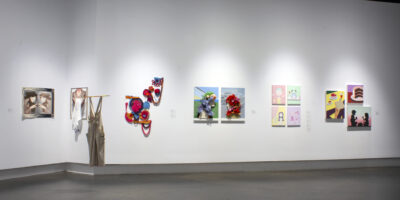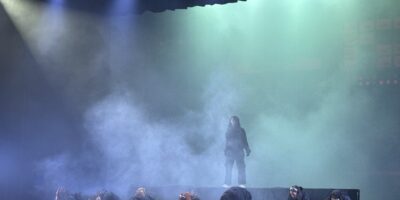As a preface, I was probably going to write about this album even if it was terrible. I just have a huge soft spot for the Arcade Fire. I credit them for being the catalyst which turned me into the music nerd that I am today. Their 2005 debut, Funeral, which stands as possibly the finest album of the decade, came out when I was in 8th grade, right in the middle of the formative years where I was moving through the “edgy” phase of my musical tastes (Linkin Park, My Chemical Romance, Fall Out Boy and Panic! At the Disco all featured prominently on my iPod Mini). It was the first thing I listened to as an album, with its recurring themes (and song titles). And although I listened to it alone (it took like two days to download on LimeWire), it really felt like a shared experience. Funeral was a triumphant album: ragged, joyous and youthful. It had never crossed my mind that you could have a rock band with nine people singing at once, or realize that if you do you can create songs like “Wake Up.” It was a milestone album for me, and I still go back to it to this day. Now, eight years and two more albums later, they’ve given us Reflektor, their fourth full length. Don’t be alarmed by the first sentence of the review, though. Reflektor is in no way a bad album, although it doesn’t reach the heights of Funeral. It’s Arcade Fire’s loosest record, their longest record, as well as the record where it sounds like they’re having the most fun.
A lot has gone on between Funeral and now. Arcade Fire have released two albums in that span: 2007’s haunting, paranoid Neon Bible and 2010’s stately, meditative (and Grammy Best Album-winning) The Suburbs. And as much as Arcade Fire probably don’t want it to, the Grammy win matters a lot. Although Funeral was lauded by pretty much every single music writer on the planet, it didn’t shoot them into U2-like superstardom by any means. This was incredibly evident after the Grammy win, where the ever informed social media spheres began the “Who the F*ck is Arcade Fire?” campaign. But now, they have eyes on them, and I’m sure there was pressure in the lead-up to Reflektor’s release. This was evident even in the album roll-out. Arcade Fire stole some moves from Kanye West and graffitied the Reflektor hieroglyphics on buildings, as well as played hidden shows in trendy Montreal clubs as “The Reflektors.” And it seemed to have worked. The hype leading up to this album was huge, and Arcade Fire lived up to expectations by releasing a sprawling, messy, and gorgeous double album.
If Funeral was the Arcade Fire’s London Calling, or their Siamese Dream, then there is no doubt that Reflektor is their Sandinista! or Mellon Collie…, albums that indulged in their creator’s every whim and left turn and still ended being landmarks. The album is indebted to band member Regine Chassagne’s homeland of Haiti and the Caribbean feel permeates through the entire album. From the first song, aptly titled “Reflektor,” you know this is an Arcade Fire album, whether it’s from Win Butler’s paranoid vocals, Regine Chassagne’s French, the mentions of meeting a “resurrector,” or even the creepy Anton Corbijn-directed video. But the song also moves in ways an Arcade Fire song never has, taking the precedent set by Suburbs highlight “Sprawl II (Mountains Beyond Mountains)” and using it to create a warped, not-quite-disco song, complete with falsetto, elliptical synthesizers, and bass saxophone. From there, the album moves into funk grooves on “We Exist,” distorted rock n’ roll on “Normal Person” and epic arena stomp on “Joan of Arc.” This all comes on the first disc of the album, and doesn’t even touch on the highlight of the first disc, “Here Comes the Night Time.” The fourth song on the album, it sounds for about the first ten seconds like it’s going to be a whirlwind of a song, with high speed guitars and bongos. And then, it slows itself way down into a churning bass groove, with Win Butler trying his best to rein in his voice around the groove, and rollicking piano cutting him off when he can’t. It reminds me of Vampire Weekend insomuch as it’s a huge, awkward and joyous cultural appropriation. It’s one of the weirdest and bravest experiments by the band, and somehow it’s successful.
The second disc of the album also has a few highlights, but it is slightly marred by some of the songs lengths and repetition, although almost all double albums have the same problem. In spite of this, a few of the songs are hugely successful, including the epic and choral dirge “Awful Sound (Oh Eurydice)” and the keyboard-flecked “Afterlife’” which brings to mind some of the more uplifting songs on Funeral.
Reflektor is the strangest of Arcade Fire’s four releases, and will probably be the most divisive as well. It takes its cues from anywhere, including 70s rock n’ roll, calypso, disco and, due to producer James Murphy (of LCD soundsystem fame), dance. It is wild, awkward, unfocussed and long. It doesn’t have a singular vision, unlike the three previous releases, and instead focuses on textural washes and thematic shifts. But none of this should be taken as marks against the album, because I’m sure that is exactly what Arcade Fire planned. And, like Funeral before it, I will probably be going back to it for years to come.




Leave a Reply